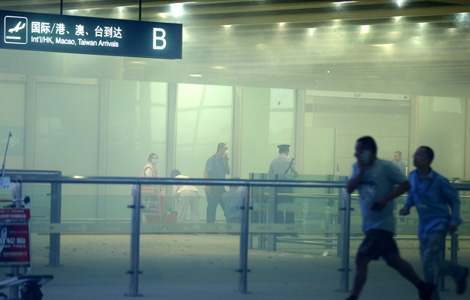Blacklist on way for court defiance
Updated: 2013-07-20 01:01
By ZHANG YAN (China Daily)
|
|||||||||
The top court will blacklist people who refuse to abide by court rulings, in a move that may eventually restrict their business activities and market access.
The Supreme People's Court will publish the list from Oct 1, as an increasing number of court decisions have not been complied with in recent years.
The blacklist aims to "urge these people to fulfill their legal obligations, and to help build a social credit system", Liu Guixiang, director of the implementation bureau under the court, told China Daily.
People who intentionally refuse to abide by court rulings, through means such as fabricating evidence, and using violence and threats, will be included on the blacklist.
Those who hide and transfer their assets by filing lawsuits will be considered as defying the law, and will be blacklisted.
Others to be placed on the list include those who violate the courts' asset reporting system or spending limits and those who are financially capable but defy rulings deliberately.
From January to June, the number of rulings not complied with stood at 1.7 million nationwide, an increase of 8 percent from a year ago, according to the top court.
In recent years, fewer than half of all court rulings have been complied with.
Zhu Yan, assisting judge from the implementation bureau under the top court, said the blacklist will be announced through the media and court bulletin boards.
People can access the list through the court's websites to make inquiries, she said.
The list will also be handed to relevant authorities, financial institutions and industrial associations.
"The blacklist will provide a basis for authorities to restrict those people's business activities, including governmental purchases, bidding, administrative approval, bank loans as well as market access," Zhu said.
The blacklist will also help address the problem of those who defy court rulings by taking advantage of an information imbalance among regions to move to other provinces where they continue their business, Zhu said.
But Liu said the legal awareness and framework need to be improved. China doesn't have a specific law for enforcement of court rulings. Although refusing to abide by a court decision can be a crime, few people have been charged with this, Liu said.
Courts will cooperate with other agencies to improve compliance with rulings, Liu added.
These agencies include the Identity Card Inquiry Center under the Ministry of Public Security, which can help courts make quick checks on those who defy rulings.
The China Securities Regulatory Commission, the top securities market watchdog, can help courts monitor investments, trading in stocks and asset information of those involved in lawsuits.
Courts will strengthen cooperation with border departments, civil aviation agencies and luxury hotels to keep track of those who defy rulings, Liu said. The information will provide a basis to bar them from leaving the country.
Zhang Meixin, director of the implementation bureau of the high court in Beijing, said the court faces obstacles on rulings compliance.
"As the entire country's legal environment is not perfect, some people don't comply with court orders. In some cases, they use violence to go against court rulings," he said.
In Beijing, more than 100,000 court rulings are not complied with each year.
Zhang said that with the arrival of the national blacklist, courts will improve cooperation with relevant authorities, financial supervisory agencies and industrial associations to "severely punish those who are financially capable but still go against rulings".
He suggested the government should set up special funds to compensate victims involved in lawsuits, in case defendants refuse to abide by court rulings.

 Man hurt in blast at Beijing airport
Man hurt in blast at Beijing airport
 Veteran U.S. journalist Helen Thomas dies
Veteran U.S. journalist Helen Thomas dies
 'Trayvon Martin could have been me, 35 yrs ago': Obama
'Trayvon Martin could have been me, 35 yrs ago': Obama
 China launches three experimental satellites
China launches three experimental satellites
 Bruce Lee's daughter recalls his energy
Bruce Lee's daughter recalls his energy
 Giving take-out roast chicken a French twist
Giving take-out roast chicken a French twist
 Tibetan farmers enjoy Onkor festival
Tibetan farmers enjoy Onkor festival
 Girl mauled by mastiff needs $32,580 for surgery
Girl mauled by mastiff needs $32,580 for surgery
Most Viewed
Editor's Picks

|

|

|

|

|

|
Today's Top News
Chengguan accused of brutal attack
China sends strong signal of "deep-water" reform
China commits to building eco-civilization: Xi
New H7N9 patient in critial condition in Beijing
Guizhou aims to become "Switzerland in the East"
Asiana flight passenger killed by rescue truck
Man hurt in blast at Beijing airport
Dead vendor's family compensated
US Weekly

|

|







